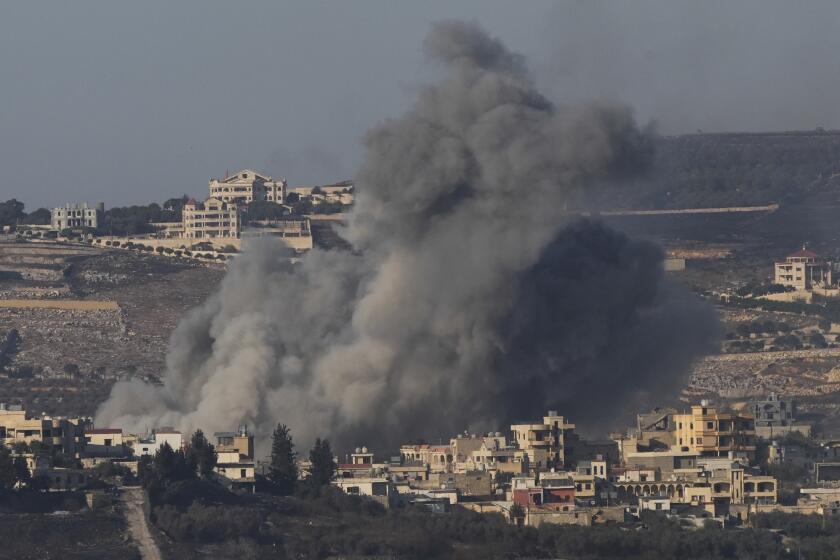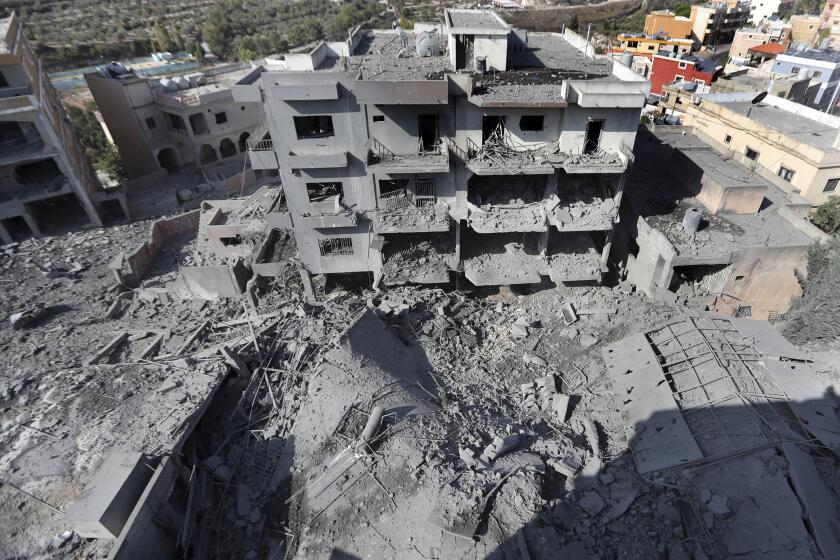Media : Muslim Voices Joining Mideast’s Press Chorus : New newspapers oppose secularism and the West and promote Islam as the political idiom of the future.
As the riots focused world attention on Los Angeles last spring, one newspaper gave its twist to the news in large red and green letters across the top of its front page. “Divine Justice,” the Egyptian weekly Al Nour proclaimed. “Los Angeles Tastes Bitterness of Kuwait and Baghdad.”
According to this account, the violence wasn’t the product of a faulty legal system, or racial discrimination, or even the momentary triumph of the have-nots over the haves. It was the will of God.
“Divine justice has hit the U.S. The slogans of democracy, human rights, the respect of minorities and other such slogans praised by the West and considered there as the base of progress and the foundation of democracy were defeated,” Al Nour announced cheerfully. “Just as communism collapsed, the next years will witness the collapse of Western society from the inside.”
The same newspaper--published in a country that is America’s strongest ally in the Arab world--had a few months earlier termed George Bush “the worst man on the face of the earth.”
This is the voice of Islam, its message printed in tabloids, magazines and booklets that are becoming one of the most important instruments of political opposition in the Arab world.
No longer limited to leaflets from extremist groups declaring jihad or newsletters from Muslim universities expounding on the Koran, the Islamic press has evolved into an influential alternative medium in virtually every country in the Middle East and an outlet for some of the region’s most prominent intellectuals.
Al Shaab in Cairo, officially the organ of the Egyptian Labor party but in fact the voice of the Muslim Brotherhood, reaches an estimated 250,000 readers a week, many of them outside of Egypt. Al Ribat, the Muslim Brotherhood organ in Jordan, reaches up to 15,000, and the now-shuttered publication of the outlawed Islamic Salvation Front in Algeria, Al Forkane, was usually sold out from the newsstands within minutes of its arrival.
There are regular Islamic publications in Morocco, Egypt, Jordan, Saudi Arabia, Sudan, Iraq, Iran, the United Arab Emirates and Yemen, in addition to much of Muslim Asia--countries whose governments range from secular Baathist to traditional monarchist. And their message is, by degrees, the same: a call to the world’s 2 billion Muslims to stand together against secularism, oppression and the West and to adopt Islam as the social and political idiom of the future.
“After the number of people we had elected to Parliament (in 1989) . . . it was very necessary for the Islamic movement to have a newspaper to reflect its point of view, thoughts, programs, to make a connection between them and the people inside and outside,” said Kamel Rashid, editor of Jordan’s Al Ribat.
The slow rise of democracy in the Arab world has fueled the growth of the Islamic press, which, because of the reluctance of many regimes to appear to be criticizing Islam, is often allowed to operate with a freer hand than much of the secular media.
Egypt’s Al Shaab, particularly detested by the government, has waged a nonstop campaign against official corruption, particularly targeting the country’s former oil minister. It editorialized against the allied coalition involvement in the Persian Gulf War, and even President Hosni Mubarak has felt its journalistic sting.
“You can easily differentiate between what we publish and all the other media,” said Al Shaab’s editor, Adel Hussein, a former Marxist who has become one of Egypt’s best-known Islamic writers.
“Our main topics are different. We have committed to certain red lines which we do not cross, according to our Islamic beliefs, which others may cross: From minor things--we don’t for example publish any advertisement for alcohols, we do not say something positive even about cigarettes, we don’t publish naked women--to major things--we cannot accept Western dominance, we cannot accept imperialist invasion in the spheres of culture, values and economy.”
The Islamic press has helped frame international issues in a new perspective, loudly condemning the political conflicts in Bosnia-Herzegovina, Myanmar, India and Indonesia as a worldwide “massacre” of Muslims that it often equates with the 12th- and 13th-Century Crusades.
Last spring, Al Shaab used the Muslim feast that follows the fasting month of Ramadan to solemnly declare: “On the occasion of the Eid al-Fitr feast, our joy was wasted. This is because the Islamic nation is going through the worst era of its history. Everything is sold. America is playing the role of the hooligan in the Islamic world. It led the West and its followers into the destruction of Iraq. It is now besieging our people in Libya in preparation for a military strike. The Security Council is used in all this as a toy. . . .”
The Gulf War represented a kind of coming-of-age for much of the Islamic press, which until then had largely been preoccupied with issues of women wearing veils in public, the sale of alcohol, the imposition of Islamic sharia law and internal political questions.
“We weren’t interested in having a struggle with the political Establishment,” said Hussein Aroush, editor of Egypt’s monthly Al Mokhtar al-Islamiya. “But unfortunately, political events forced us to come out and change our voice to a more revolutionary voice.”
The war split the Islamic press, as it did much of the land of Islam. Moderate Islamic newspapers like Egypt’s Al Nour editorialized loudly against Iraq’s invasion of Kuwait, particularly when it was followed by the massacre of Muslim Shiites in southern Iraq.
But much of the rest of the Islamic press was outraged by the introduction of Western forces into the conflict and, like Egypt’s Al Shaab, came out on the side of Iraq--to the fury of pro-Western Arab regimes.
The Egyptian Muslim Brotherhood’s Al Liwaa al-Islam was shut down and its editor arrested. Al Shaab’s Hussein faced charges as well, but political analysts here said the government ultimately feared that Al Shaab was too popular to ban.
Al Shaab did more than editorialize on Iraq’s behalf: It reported on battlefield “events” that simply never happened. It carried, for example, an “exclusive” report about a fictitious Israeli airlift of 24 giant transport planes supposedly ferrying vegetables, fruit and liquor to U.S. military personnel in the Gulf.
U.N. Secretary General Boutros Boutros-Ghali, a Christian Egyptian who was heralded by many as the Arabs’ entree to international politics, has not fared well in the Islamic press, which tends to view him as an instrument of the West. Al Shaab calls him “an Arab plight.”
The Islamic press has not given up on such familiar themes as the role of women. Consider the January issue of Al Raai al-Aam, an English-language Islamic paper, which examined the recent wave of crimes in Egypt committed by women.
“The reason for the spread of crime is that the Islamic community has deserted its habits and traditions and principles . . . and is begging East and West for (new) customs and traditions. . . . One of these imported traditions is the absolute freedom the West gives a female, letting her upsurge unharnessed in life-enjoyment fields. Parts of her body are naked whenever she desires, while she does whatever she likes without control. . . .”
Just as often, the Islamic press helps define the issues most important to the Muslim world--the relationship between Islam and politics, the meaning of democracy, how a modern Muslim defines himself in a world dominated by Western thought. And it is the Islamic press that has pushed most strongly the argument for democratization in the Arab world.
One of the last issues of Al Forkane, the French-language publication of Algeria’s now-outlawed Islamic Salvation Front, showed a picture of thousands of Algerians marching in the streets with the headline, “That Dictatorship Will Cease, and Liberty Will Triumph.”
Yet the Islamic press has been blamed for taking too activist a role in Arab politics, to the extent, some critics say, of inciting Islamic extremist groups to commit acts of violence.
When prominent secularist journalist Farag Foda was shot by Islamic fundamentalists in Cairo recently, the Islamic press, which had attacked him relentlessly, was accused by secularist critics and some government officials of sharing in the blame.
“In my belief, this is a criminal responsibility. . . . Most of the time, (the Islamic media) are creating dissension and strife. They threaten us, believing that after that the young gentlemen may murder us, just as what happened to Farag Foda,” complained Said Ashmawi, head of Egypt’s Supreme State Security Court.
Haroush, of Al Mokhtar al-Islamiya, argued that the Islamic press has been unanimous in condemning the Foda assassination. “But Farag Foda . . . should have taken more care about what he wrote. If there was any provocation, it was from Foda first,” Haroush added.
In Egypt, publications like Al Shaab that are affiliated with a legal political party (though the Muslim Brotherhood is banned, the Labor Party acts as a front for brotherhood candidates) get some funding from the government. But most rely on donations or support from Islamic financial and political organizations, or income from related Islamic book publishing houses. Advertising is usually minimal.
Islamic writers and editors complain that their influence will remain minimal as long as they have no access to national television or national publications. While Al Shaab has 250,000 readers, for example, 1.25 million people read Egypt’s official daily, Al Akhbar, and 800,000 read the official Al Ahram.
As long as the major, government-funded daily newspapers and television stations are still in the hands of Arab governments, Hussein said, the Islamic press will remain a voice of opposition with little real opportunity for influence.
“Before asking me, ‘Can you say what you believe or not,’ ” he commented, it must be remembered that “even if I can, how many people will listen?”
More to Read
Sign up for Essential California
The most important California stories and recommendations in your inbox every morning.
You may occasionally receive promotional content from the Los Angeles Times.










